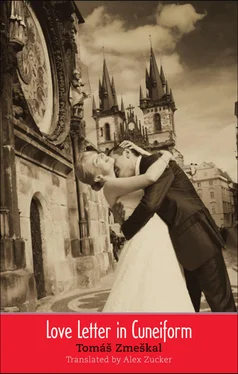“They must be foreigners,” said Antonín.
“I’m a foreigner too,” said Jiří. “Sort of.”
“No, you’re not. You speak Czech.”
“Oh, right,” said Jiří. “I didn’t think of that.”
The waiter looked as if he were about to deliver a long speech, but then instead just asked if anyone wanted to settle their check. Jiří said: “I thought it was a cat, that whole time, till I saw it.”
“Me too,” said Antonín.
“Talk about out of thin air.”
“Right, exactly, but let’s not even talk about what plans they might have had for it in the kitchen.”
“Plans? In the kitchen?”
“Yeah.”
“No, I agree, let’s not.” After a pause, Jiří went on. “So tell me, how did things end up with, you know, what’s her name, Klára?”
“Klára?” Antonín said. “How did things end up with Klára?”
“How did you finally meet her?”
“Well, sometimes she was better, sometimes worse. Eventually she started going under on us. Her depressions were very deep.”
“I’m not surprised,” said Jiří, “after what she went through.”
“Of course, and then she underwent shocks, electroshock treatment.”
“There was nothing else you could do?”
“There was — leucotomy — but that’s even worse.”
“What’s that?”
“The term by which most laypeople know it is lobotomy. The separation of the frontal lobes from the rest of the brain.”
“My God, that’s barbaric.”
“It’s an irreversible operation.”
“It’s barbaric.”
“Seeing as you’re a layperson, I’m not going to discuss it with you, but the whole principle of treatment is based on the degree of knowledge available or accessible to us at any given moment.”
“Does that apply to logic, too?”
“I don’t know.”
“Didn’t that seem strange to you, just cutting up somebody’s brain?”
“It wasn’t just cutting up a brain.”
“But afterwards the people weren’t themselves anymore.”
“They were, to some extent, and we hoped it was the better part, the part that wasn’t harmful.”
“To some extent?”
“Yes, though it’s true sometimes we couldn’t say if it was more or less.”
“Didn’t you care?”
“Of course we cared.”
“Then how could you do it?”
“We were trying to help the patients. We just wanted to help.”
“It never occurred to you that you might be harming them?”
“Without a little harm there wouldn’t be any medicine.”
“A little harm. You call that a little harm?”
“Don’t pick apart my words.”
“You’re the one who said it.”
“It was used only in extreme cases.”
“Could you still have fallen in love with her after that?”
“You seem pretty worked up all of a sudden.”
“Could you still have loved her after that?”
“One thing at a time.”
“Well, could you?”
“One thing at a time, please, if you don’t mind. I don’t know. How could I? And besides, in the end we didn’t do it.”
“Not to her, you didn’t.”
“Of course it was performed on other patients, and at the time I was trying to focus on other things.”
“So you never had any doubts?”
“Of course I did. But I also believed. Not because it was absurd, but so I could understand. I tried to understand, and I did. At least back then I thought I did. I thought we were all in God’s hands, to some extent.”
“You don’t think so anymore?”
“Not after what happened to Klára.”
“It sounds like a very hard decision, but nature isn’t God. Maybe it’s more like He allowed it.”
“Where is God’s will in all this? Where is suffering? When hunger drives the wolves out of the forest … and man is a wolf to man? And when our loving God is a wolf?”
“Our?”
“Of course our . There’s no point trying to get out of it, even if you don’t believe. A loving God goes only where He belongs.”
“Where he belongs?”
“If he stayed in a hotel, I would definitely give him a worse room than Koch.”
“Who’s Koch?”
“Robert Koch. He’s no longer with us, but back in his day, he worked on TB. But I’ve wandered off topic again. What I wanted to say was, electrotherapy worked for depression, but we weren’t prepared for the side effects.”
“Side effects?”
“At first we didn’t understand. One of the nurses actually figured it out before any of us.”
“Figured out what?”
“Klára started getting visitors. More and more. Then one day the chief physician called me in and told me what he’d discovered. The number of visitors always increased whenever she had electrotherapy.”
“Electrotherapy?”
“Every visitor had to sign in to the register on the unit, and when the chief physician looked at the register and Klára’s chart, it lined up. He pinned it on the head nurse. At first she tried to wriggle out of it, but in the end she told the truth. Klára was telling fortunes.”
“Fortunes? What do you mean?”
“She was predicting the future.”
“Predicting the future?”
“Yes. Klára was predicting the future.”
“What? How?”
“In fact, ever since she had begun getting electroshock, for two or three days after, she would complain that her head hurt and she couldn’t get out of bed. There was nothing strange about that in itself, but then one day the head nurse’s son was supposed to travel to Košice, and she said to someone in front of Klára that she wished her son would leave already, so she could finally get some proper cleaning done at home. At which point Klára interjected that her son wasn’t going anywhere and she would be glad for it, too. The head nurse remembered her words. A few days later, two local trains crashed into each other. Nothing too serious, but they brought in a few of the injured to our hospital. The head nurse was on pins and needles, since her son was supposed to have been on one of the trains. He wasn’t on the list of injured and the police didn’t have him on the list of passengers. At noon he turned up at the hospital to see his mother. It turned out he had just overslept. He didn’t even know about the accident. In a rare show of emotion, the head nurse threw her arms around his neck. But she remembered what Klára had said, and the next day she asked her how she had known, but Klára didn’t remember. It was like it had been erased from her memory. The head nurse mentioned it to the other nurses, and word spread. That also explained the unusual rise in requests to work on the unit on certain days. They just started asking her questions.”
“About what?”
“Everything. One of the nurses wanted to know whether she and her husband were going to get the money his parents had promised them. Another wanted to know whether their adoption would come through. Another asked about her inheritance.”
“So … what were the results?”
“She was right about all of them.”
“Really?”
“Really. Usually her state would only last a day or two after the shocks, then it would stop. She could take one, two, three questions at most, then she’d be exhausted, fall asleep, and it wouldn’t work after that.”
“What did you do about it?”
“Do? We wanted to study it somehow, since the electrotherapy was helping. She wasn’t in danger anymore of needing a leucotomy.”
“I still find the whole thing barbaric.”
“Please, I’ve had patients who were so depressed, sometimes even suicidal, that they got down on their knees and begged me for the treatment.”
“I don’t doubt your goodwill, or the expertise of your diagnosis. I’m just saying the practices in your day strike me as barbaric.”
Читать дальше












